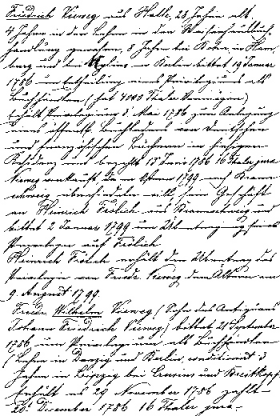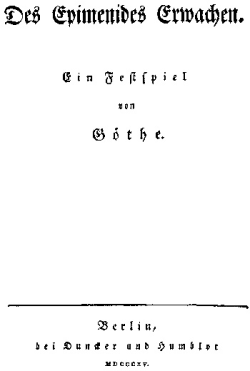History of Duncker & Humblot
1798
Heinrich Frölich obtains the right to print and sell books from the bookseller Friedrich Vieweg and founds his own publishing company.

Fig. 1: Frölich's license
1805
For assistance with of some of his duties, Frölich appoints the 26-year-old Carl Friedrich Wilhelm Duncker as his coworker. After Frölich's death, Duncker becomes the manager of the publishing house.

Fig. 2: Carl Friedrich Wilhelm Duncker
1809
Duncker takes over the publishing house along with his friend Peter Humblot. Since that time the company has operated under the name of Duncker & Humblot.

Fig. 3: Title page of »Des Epimenides Erwachen«
After the 1813-1814 war of liberation the young publishing house flourishes. Numerous literary works are published in this period, such as Goethe's »Des Epimenides Erwachen«, E.T.A. Hoffmann's »Die Elixiere des Teufels« and Joseph von Eichendorff's »Dichter und Gesellen«. However, the main focus is already on scholarly publishing, especially in the field of philosophy (first complete edition of Hegel's works) and history (beginning of the cooperation with Leopold v. Ranke).
1866
The publishing firm is taken over by Carl Geibel and son, who proceed to relocate the company to Leipzig.

Fig. 4: Title page of the »Allgemeine Deutsche Biographie« 1875
The cooperation with Ranke is intensified and in 1869 the first edition of the »Allgemeine Deutsche Biographie« is planned. From 1870 on, social and economic sciences are part of the publishing company's program. The cooperation with Gustav von Schmoller and the Verein für Socialpolitik has its origin in this period.
1910
After Carl Geibel's death, his son Stephan Franz Carl Geibel becomes head of the company and relocates the firm to Munich. Dr. phil Ludwig Feuchtwanger, a brother of the author Lion Feuchtwanger, is appointed as publishing manager. Under his guidance, many well-known authors are drawn to Duncker & Humblot, such as the economists Joseph Alois Schumpeter and John Maynard Keynes or the sociologists Werner Sombart and Georg Simmel. Max Weber also publishes several important books with Duncker & Humblot, such as »Politik als Beruf« in 1915. The cooperation with the expert on constitutional law, Carl Schmitt, begins under Feuchtwanger's management.
1938
After the Nazis seize power, Feuchtwanger is forced to give up his post. Following a short internment in Dachau concentration camp, Feuchtwanger emigrates to England, where he dies in 1947. In 1938, Dr. Johannes Broermann acquires the publishing house from Stephan Franz Carl Geibel and moves the company back to Berlin. During World War II the company endures hard times. Only through the tireless efforts of Broermann can the publishing house prevail.
1947
The United States' military government issues a license that permits the publishing house to resume business. In 47/48 the project »Neue Deutsche Biographie« is launched, a follow-up to the »Allgemeine Deutsche Biographie«. The newly founded Verein für Socialpolitik also publishes its findings with Duncker & Humblot. Over the subsequent years, Duncker & Humblot proceeds to become one of the most renowned scholarly publishers, especially in the fields of law and social science. Numerous series and periodicals are founded in this period.
1984
After Broermann's death his nephew Professor Dr. h.c. Norbert Simon takes over the publishing house. Under his aegis book production is raised from approx. 180 to 350 titles per year.
2005
Dr. Florian R. Simon (LL.M.) joins the firm alongside his father. In 2008 Duncker & Humblot starts to publish electronically. 2010 sees the launch of the »Duncker & Humblot eLibrary«.
